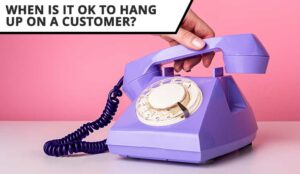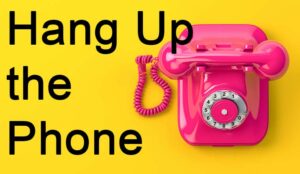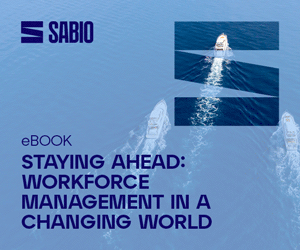In the world of customer service, the age-old mantra “the customer is always right” is increasingly being put to the test.
As front-line agents face rising levels of abuse, hostility, and even harassment from callers, many are asking the same question: Is it ever acceptable to hang up on a customer?
To explore this contentious issue, we reached out to our readers and industry experts to find out when – and how – customer service representatives can justifiably hang up.
Can Customer Service Hang Up on a Caller?
Can customer service hang up on you? The simple answer is yes.
The reasons to hang up on a customer vary from company to company, and Shushil, one of our readers, has noted four key reasons which will apply to most contact centres:
- The caller is constantly making personal insults against the representative
- The caller is constantly yelling or screaming
- The caller is being consistently arrogant and completely refuses to listen to logic (e.g. keeps insisting that he/she is right and that the representative is wrong, regardless of the information being presented)
- The caller is making physical threats and other extreme things of that nature.
Once you have listed these and any other possible situations, Shushil suggests that you develop an operating procedure for each one.
“For most instances, the customer should get at least one warning prior to being hung up on. A lot of times, companies will transfer angry customers to a supervisor or manager who will deal with the issue. It really depends on the company and its culture.”
Hanging up on Rude Customers – Make Sure the Protocol Is Clear
While your policy on this topic should be linked to your company culture, the operating procedures for when to hang up on a customer should be made clear to the team. However, these rules will vary from one scenario to another.
For each “reason to hang up”, try to create an operating policy that agents can follow to handle the call.
Shushil has provided an example policy for handling a call with a customer who is constantly cursing, and we’ve put together some profanity warning spiel that your agents could use at each step.
Example Policy:
Step 1 – Give a Polite Warning
Give the customer a polite warning that cursing/using profanity will not help solve their problem.
Example
- “I understand you’re upset, and I’m here to help. However, using offensive language won’t help us resolve the issue. Let’s work together to find a solution.”
- “I can hear that you’re frustrated, and I want to help resolve this issue. Please understand that using offensive language isn’t necessary, and it won’t speed up the resolution.”
- “I understand this is a frustrating situation, and I want to help. However, I need to ask you to refrain from using offensive language so we can work together to solve the problem.”
Step 2 – Give a Final Warning
If the customer continues to curse, say if they curse again, you will have to hang up on them and they can call back once they’ve calmed down.
Example
- “I’m here to assist, but if the profanity continues, I’ll have to end this call. You’re welcome to call back when you’re ready to talk calmly.”
- “I want to assist you, but if the cursing continues, I’ll have to end this call. Please call back once you’ve had a chance to calm down, and we can address your concerns.”
- “I want to resolve this for you, but if the profanity continues, I will have to disconnect the call. Please feel free to call back once you’ve had a moment to calm down.”
Step 3 – End the Call
If the customer continues to curse, say “I’m sorry, but I’m going to hang up on you now, due to the repeated bad language. Please call back when you are happy to discuss the matter calmly,” and hang up immediately.
Example:
- “I’m sorry, but I’m going to hang up now due to the repeated use of bad language. Please call back when you’re ready to discuss the matter calmly.”
- “I’m sorry, but I need to end this call due to the ongoing use of inappropriate language. Please reach out again when you’re ready to have a constructive conversation.”
- “Unfortunately, I’m going to have to end the call now due to the continued use of bad language. Please call back when you’re ready to discuss this respectfully.”
Step 4 – Report the Incident to a Supervisor
Let the Team Leader/Manager know that you’ve just hung up on the customer, describe the situation in the call log and make a note of it in the customer’s account.
Explaining this operating procedure, Shushil says: “It’s not a script, but general guidelines as to what the representative should do. That way when the customer calls back an hour later, the next representative can be prepared for what may happen (a rude and angry customer).”
“Or, if the customer service representative isn’t good with those situations, the call can be routed to a different advisor who is accomplished at handling angry customers.”
Evolving Policies for Handling Abusive Customers
Revisit the Three-Strike Rule
For general customer service contact centres, there has been a long-standing three-strike rule. This dictates that after the third “offence”, the advisor can hang up on the customer.
However, this rule is difficult for advisors to stick by once the customer goes further than just being rude. For example, what can they do when they are subjected to racist, sexist or homophobic abuse? What about when the advisor receives a threat of violence?
Diamond, one of our readers, asks us to think about it this way: “If the co-worker beside you used racial slurs about you, would you wait for them to repeat it before heading to HR? NO!”
Tina Till, a Contact Centre Operations Manager, says: “It’s important to understand the context in which the contact centre team works and provide them with tools to support them if caller behaviour gets out of hand.”
This highlights the need for having operating procedures and a policy for dealing with abusive customers. The policy should provide guidance to advisors in all possible scenarios, highlighting the difference between an abusive and an angry customer.
One key scenario that could be included is an escalation process if the advisor believes that the situation can be turned around but is struggling to navigate the situation.
This is according to Tina, who says: “Ideally, any terminated or escalated calls should be listened to afterwards with the team member, as part of ongoing development and support.”
Call Termination Practices
While many contact centres implement this three-strike rule for handling calls from rude customers, there are other contact centres that use a slight variation of this rule.
For example, David Payne – Head of Client Development at Bright – says: “In my contact centres, we only gave one polite warning about unacceptable customer behaviour (swearing or inappropriate advances) and then staff were allowed to terminate the call.”
While this seems like standard practice, David adds that before the advisor hung up on the customer, they first had to explain why. However, the advisor did not have to wait for the customer to respond to their explanation.
This seems to be good practice because the customer is made immediately aware of why their call has been terminated, and the number of customers who called back to demand an explanation for why their original call was cut would, in theory, drop.
However, there were one or two exceptions to this protocol.
David explains that “when the advisor had to deal with heavy-breather calls or calls asking for details of underwear etc, they were allowed to terminate immediately without warning.
Once the advisor had terminated the call, it was then expected that they notified the manager immediately – who could then offer support and listen back to the call.”
Find the Balance Between Advisors and Protocols
While having these rules in place is deemed in the best interests of advisors, some of our readers believe that highly skilled advisors should be able to turn almost any situation around.
Richard Beevers, Director at Customer Plus, shares this belief. He says: “Difficult behaviour by a customer with legitimate business can always, yes always, be turned around by a skilful advisor.
The paradox of course is when the advisor him/herself causes the frustration and is therefore unlikely to have the skills or mindset to calm the situation.”
However, Richard does stress that there should be exceptions when the advisor should be allowed to hang up immediately. These include: “Criminal behaviour and sexual harassment are different and warrant immediate termination.”
So, if your approach is to ask advisors to stay on the phone – make sure they are highly trained and aware of these exceptions.
While the tactic of having a “do not hang up” rule – as long as the call doesn’t include criminal activity or sexual harassment – may damage morale, it does have its advantages.
This is according to David Cerezo, a customer service manager, who says: “If you reach an impasse, transfer the contact to a senior or a colleague. Remind the customer that we can only resolve their issues if there is an air of reasonable behaviour.
We must be bigger and stronger than our upset customers. When they simmer down, you may learn what triggered them.”
Navigating Difficult Customer Interactions
Put Yourselves in the Customer’s Shoes
This is something that many customer service employees have grown tired of hearing. But it has become a cliché for a reason.
Just as in any situation in life, if you can try to understand why someone acts as they do and “put yourself in their shoes”, your focus and empathy will improve.
As David, one of our readers, says: “We empower the team to manage the call and take control in whichever way seems appropriate. Their job is to understand the motivations behind the call, their position, and take whatever actions are necessary.”
David’s comment highlights the link between the topic of when to hang up on a customer and advisor empowerment.
For example, perhaps the advisor has given their three strikes, but they still feel comfortable and confident that they can turn the conversation around – hanging up may not be the best decision.
Coaching resilience as an important advisor skill and empowering advisors to decide when enough is enough is one way to approach this. Giving advisors a minimum number of warnings to give to an angry customer, after which they can decide whether or not to hang up could be best practice.
Charles, another one of our readers, says: “We give our advisors a minimum of two warnings. In the third instance, agents can then advise that due to the customer’s behaviour and conduct, they will terminate the call. However, if the advisor still feels in full control, they can carry on if they wish.
If at any time, an agent is unable to provide warnings or control the conversation, escalate immediately.”
Don’t Use the Phrase “Calm Down”
There is no better way of irritating an already frustrated customer than by saying “calm down”, so avoid using this phrase when warning customers that the call may be terminated.
When responding to the customer’s first rant, try to use empathy. If the customer keeps “venting”, it is still best to avoid saying “calm down” – there are much better phrases to use.
For example, why not say: “I can solve this problem for you, but only if we can discuss it calmly.”
The phrase “calm down” can have just the same negative impact as a statement like: “If you keep shouting, I’ll terminate this call.”
Avoid “laying down the law” with rude customers, it will only rile them further. Ideally, advisors should make it clear that they are on the customer’s side.
As Annette Miesbach says: “Advisors should be trained to try to salvage the conversation with patience and empathy, if possible.”
“Preparing for these difficult situations and conversations includes appropriate training, documentation of high-difficulty responses and procedures, as well as supervisor availability in case of escalation.”
For more customer service phrases to avoid, read our article: “Calm Down, Dear…” Words and Phrases an Advisor Should NEVER Say to an Angry Customer
Unfortunately, there is no clear answer as to when the advisor can hang up on a caller. While the “three-strike rule” may be a mainstay in many contact centres, is it really OK to subject an advisor to criminal behaviour or sexual harassment more than once?
There are a number of reasons why an advisor might hang up a call. For each, it is best to have a set of straightforward operating procedures that advisors understand completely.
In fact, advisors can be played calls from angry/abusive/illogical customers in training and a group discussion can be led around what best to do. This will give advisors clear guidance on how to use the operating procedures in practice.
However, it might simply be a case of coaching advisors in resilience and empowering staff to trust their own tolerance levels, while ensuring that they are aware of their legal rights.
Whatever you choose to do, this is a divisive issue. So, before you start creating operating procedures, consider you company’s culture and gather the thoughts of the team.
For more insights on how to deal with difficult customers, read our articles:
- “I’d Like to Speak to a Manager” – 7 Ways to Deal With Difficult Customers
- How to Deal With Difficult Customers
- How to Handle Contacts From Challenging Customers
Author: Charlie Mitchell
Reviewed by: Hannah Swankie
Published On: 5th Sep 2018 - Last modified: 22nd Jan 2026
Read more about - Call Centre Management, Angry Customers, Annette Miesbach, Bright, Call Handling, Charlie Mitchell, David Cerezo, David Payne, Featured Articles, Handling Customers, Health Wellbeing and Stress, Management Strategies, NiCE CXone




































